What I really think about Google Chromebook Pixel
Second in a series. Fourteen days using Google's first computer, my decision is made: I would buy one and will someday (taxes are brutal, so my options are limited short-term). I firmly believe that most buyers willing to spend $1,299 (32GB WiFi) or $1,449 (64GB 4G LTE) will be satisfied with Chromebook Pixel. That's because I presume they wouldn't dole out that much without really examining how the computer would fit their lifestyle; also, Google seeks the same people coming from Windows who might buy MacBook Pro 13-inch.
Seven days ago, in my first-impressions review, I looked at the overall experience and price benefits from the perspective of hardware. Here, I start to answer larger question: Can Pixel be your main and only machine? For most people, the answer is an unequivocal "No". But "most people" isn't Google's target market.

What Google Play's first birthday means to you
One year ago, March 6, 2012, Google renamed Android Market, and nothing is the same sense. The rebranded Google Play pushed forward a transition started in November 2011, with the broad expansion of content beyond apps. The name change also represented something bigger, shift in emphasis away from broader Android to the search giant's siloed services and brands. Google sought to imitate Apple while tackling wild Amazon.
On Play's first birthday, Google Android -- not the skinned software Amazon, HTC, LG, Samsung and others ship -- is a 98-pound weakling gone super steroids. The Mountain View, Calif.-based company sells apps, ebooks, gift cards, magazines, music, movies, TV shows and devices through the online store. There were no devices available a year ago, but now accessories, Chromebooks, smartphones and tablets. Three different computers are available, including the new and Google-branded Chromebook Pixel. Also: Two different Nexus 4 smartphones and Nexus 10 tablets and three Nexus 7 slates -- four if counting 32GB HSPA+ models twice, with different cellular SIMs.
Is Chromebook Pixel worth spending $1,299? [first-impressions review]
First in a series. Chromebook Pixel is an enigma. A misfit. Some critics call it a miscalculation -- that Google created a pretty kit that offers too little value for the high price. For sure, $1,299, or $1,449 for the model with LTE, is more than most people pay. According to NPD, the average selling price of laptops at US retail was $640 in January.
But some people do pay more. Apple laptops start at $999 and, according to NPD, the ASP was $1,419 last month. Unquestionably, I see Chromebook Pixel as priced against Macs, and after using Google's laptop see it targeted at the same professionals who value Apple notebooks. The question any potential buyer should ask: Is Pixel worth spending as much as Google asks? I will answer that question in several parts -- this initial review is first.
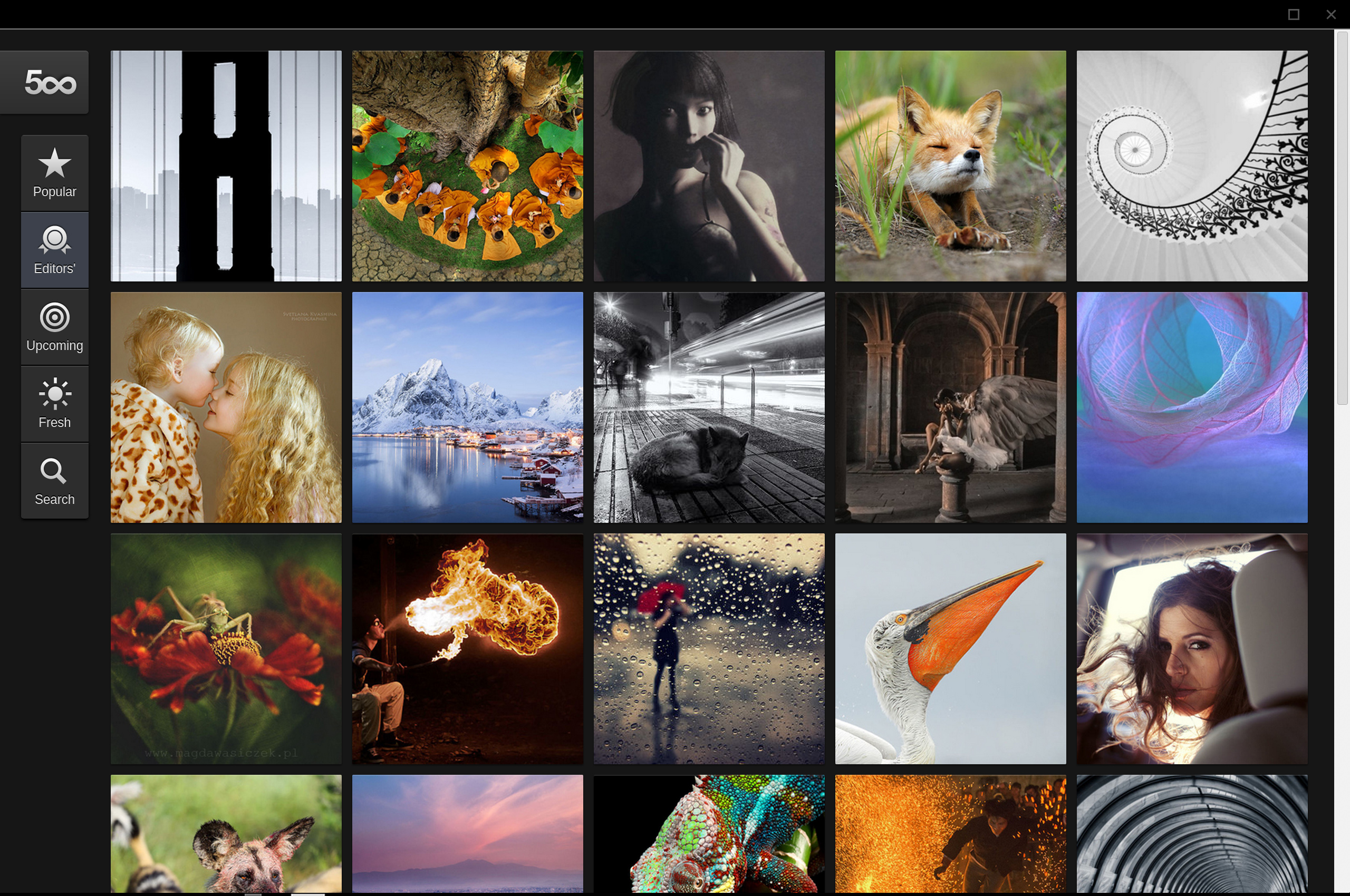
500px foreshadows Chromebook Pixel's future
Today, 500px launched a new Chrome web app that, while available for browsers running on OS X or Windows, brings something extra to Chrome OS: Touch natively-supported and optimized for Chromebook Pixel. Take a look, because this little ditty is the computer's future and hints at what Google means by the "For what's next" marketing tagline.
Chromebook Pixel is Google's pricey -- $1,299 or $1,449 laptop running Chrome OS. Pixel's naysayers -- and, whoa, there are many -- gripe about a high-priced browser PC that is useless offline and for which there are no real programs. But that's not so. Developers can, as Google has done, create "packaged" web apps that can run when disconnected from the Internet. The 500px Chrome app is one of them. Then there is the functionality fine-tuned to Chrome Pixel's magnificent 2560 x 1700 resolution touchscreen. If you can understand 500px, you might grok Google's plans for making the Chrome OS flagship truly competitive with Mac notebooks.
Whoa, you really don't want Google Chromebook Pixel
On February 21, Google started selling its first computer, Chromebook Pixel, which I called a "status symbol" over the weekend. In typical fashion I asked "Will you buy Google Chromebook Pixel?" There surely is a market for the laptop somewhere, but not among the respondents to our poll.
Seventy-seven percent of you answer "No". That's among the highest percentage ever to one of my polls. If there's Chromebook Pixel enthusiasm, it surely isn't from BetaNews readers. Just 8 percent of respondents will buy the Chrome OS laptop "as soon as available in my country". Only 16.5 percent plan to buy Chromebook Pixel ever. So has Google got a flop? No way, Jose.
Chromebook Pixel is a status symbol
Google's first computer isn't about sales but status. Critics who lambast Chromebook Pixel as an over-priced web browser wrapped in pretty hardware miss the point. Badly. The laptop will sell, but not in mass-volume because it's not meant to. Is Lamborghini about sales or style? I ask not seeing much commentary about how the Italian sports car is a failure because Ford sells millions more Explorers.
Chromebook Pixel is the luxury car of computers running Chrome OS and perpetually connected to the cloud. Google's beauty is a status symbol for people willing to plunk down $1,299 or $1,449 and makes, along with newer Nexus devices, a bold brand statement: Google is a premium brand and the company a real innovator. For the people who love the brand and want to identify with it, like all those fanboys adoring Apple with their cash, Chromebook Pixel is an easy sell.
Will you buy Google Chromebook Pixel?
That sound you just heard was Google slapping Apple across the face. Today the search and information giant unveiled and starting selling high-end portable Chromebook Pixel. By just about every measure, Google guns for Apple in its dominant market -- premium PCs, or those selling for $1,000 or more. When rumors circulated about the computer, I opined: "Chromebook Pixel looks like MacBook Pro to me". The impression is stronger now that the real deal is here -- from form factor to price, either $1,299 or $1,449.
Should Apple sweat about Chromebook Pixel? I would. Following a years-long retail trend, Apple share of PCs selling for $1,000 or more was over 90 percent in 2012, according to NPD. Stephen Baker, NPD's vice president of industry analysis, asks if Google is "more trying to compete with Apple and high-end windows machines for premium consumer and maybe corporate?" I answer: Yes. What I want to know: Will you buy Chromebook Pixel? But more importantly: Would you buy Chromebook Pixel instead of 13-inch MacBook Pro?
Chromebook Pixel is Microsoft's worst nightmare come true -- and Apple's, too
The rumors were true! Google developed a touchscreen Chromebook for release this year. Like today! No one should misunderstand what the computer means competitively. Already, four Microsoft Windows partners produce Chromebooks -- Acer, HP, Lenovo and Samsung. Chromebook Pixel promises to do for the Chrome OS platform what Nexus devices did for Android smartphones and tablets: Establish a reference design for hardware partners and provide developers base system to develop apps for the platform. But it's also a competitive move against PCs running OS X or Windows and Google pushing Chrome OS into the premium notebook market.
Today Google unveiled Chromebook Pixel, following weeks of rumors. The company also extended a vision for Chrome OS. Bottom line: Commitment to the operating system is strong. The search and information giant briefed journalists in different cities. I had to turn down an invite to the San Francisco briefing because of family matters. Do I feel left out! But, hey.
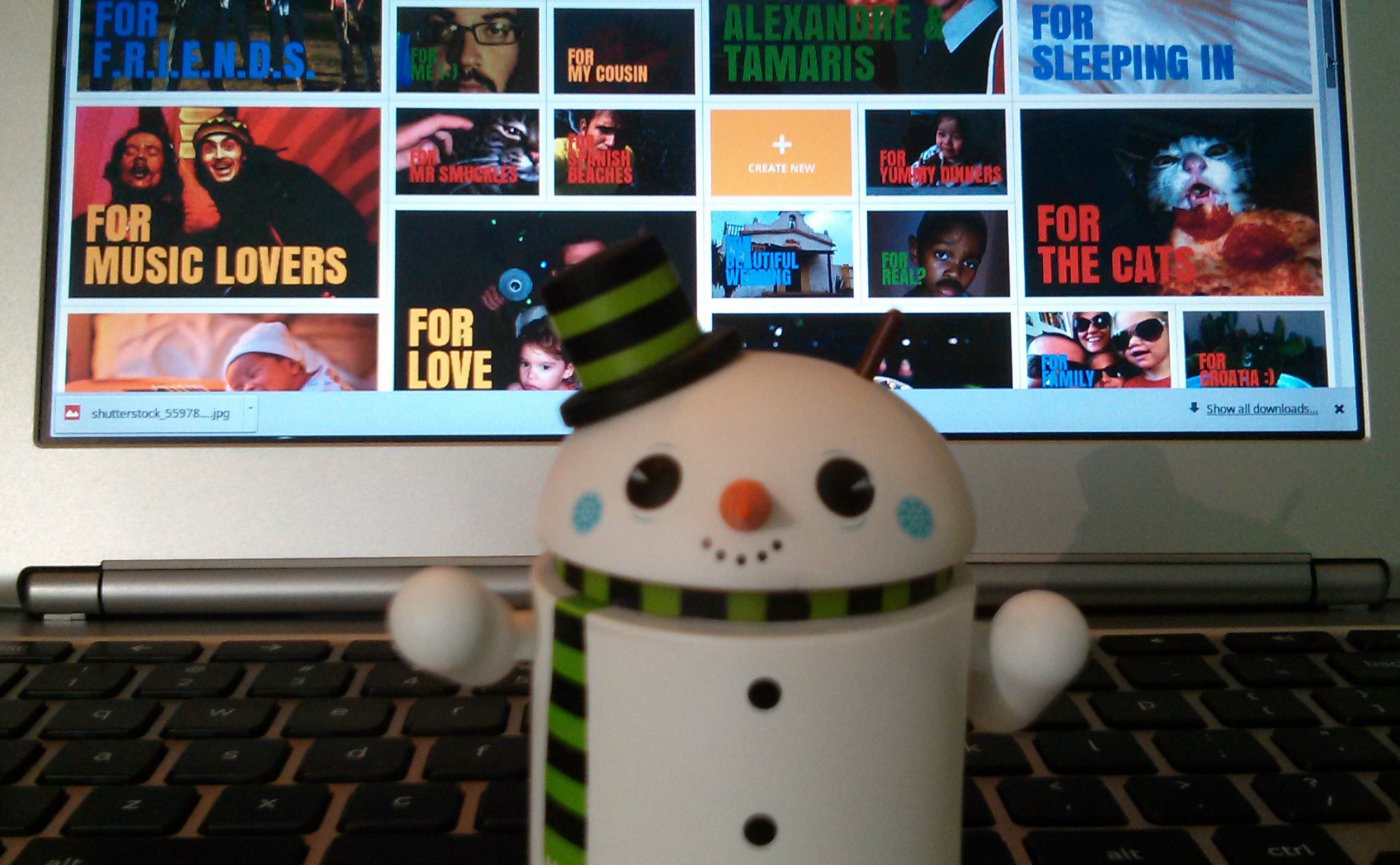
Why I love Chromebook
Third in a series. For Valentine's Day, Wayne Williams and I explained why we love Kindle and Surface Pro, respectively. We've decided to extend the concept into an ongoing series, which I continue about Chromebook and in many more ways Chrome OS.
My Chromebook journey began in December 2010 when Google dispatched 60,000 Cr-48 test units. I used the computer as my primary PC for a week, but no more, being a concept. But, then, my 11.6-inch MacBook Air failed in March 2011, and I reverted back to the Cr-48 during the emergency. In June 2011, Samsung released the Series 5 Chromebook, which I used as my only PC for two solid months. But performance couldn't meet my needs -- that is until the successor, the 550, launched in May 2011. I abandoned MacBook Air and didn't look back. Performance and features met my needs. I traded performance for better ergonomics when switching to the ARM-based Series 3 Chromebook in October.
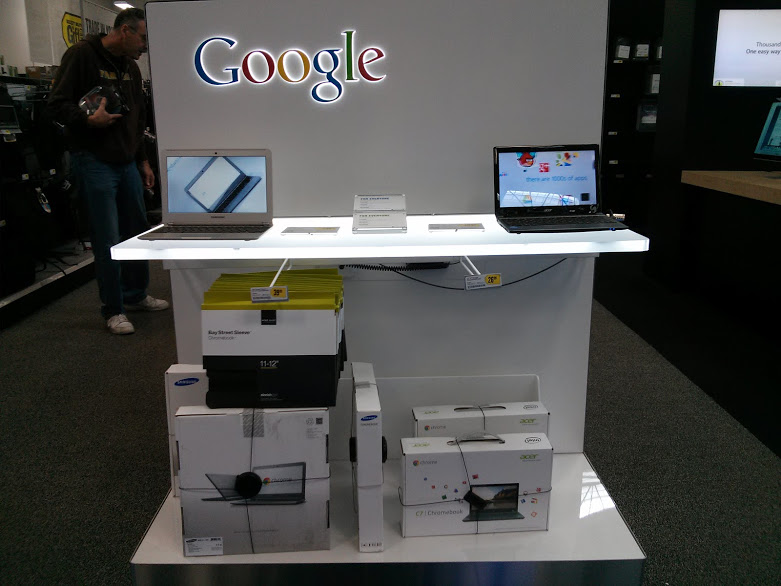
Yes! Google should open retail stores
I can't say if rumors flashing across the InterWebs yesterday are true about Google opening retail shops this year. Not that it matters. The search giant should open stores -- and lots of them. Timing is right, too, and who could have imagined two or even three years ago.
Make. No. Mistake. In the 22 months since returning as CEO (following a 10-year hiatus), Larry Page has injected new vim, vigor and vibrancy into the Google empire. The company is now one of the most disruptive forces across techdom. Android Market branding to Google Play, Google+, Google Now, Nexus tablets, low-cost Chromebooks and stores selling them inside major retailers all debuted during his watch. Then there is ever-tightening cross-integration of products and services creating one of the most formidable cloud applications stacks available anywhere. Google Now, Google Play and Android and Chrome OS devices are reasons enough for retail stores, because the company has a digital lifestyle to sell.
Chromebook Pixel looks like MacBook Pro to me
Today's buzz among Chromebook aficionados and wannabes is a leaked video for a model supposedly being developed by Google with high resolution, touchscreen display -- that's 2560 x 1700, baby. The vid went up on YouTube, then mysteriously came down, but went back up virally, adding to the intrigue that maybe, just maybe, the touchy-feely Chromebook is real. In your dreams.
Who doesn't love a good mystery, particularly gadget freaks desperate for something more and bloggers clawing over one another for greater pageviews. Conspiracy is an Internet meme that never grows old. But there's something oh-so wrong with the Chromebook Pixel shown in the video. Doesn't the computer look a whole lot like Apple MacBook Pro? Similarities are striking, which makes me wonder whether Google imitates art or this video isn't for a real product. Perhaps it's just pitch for one.
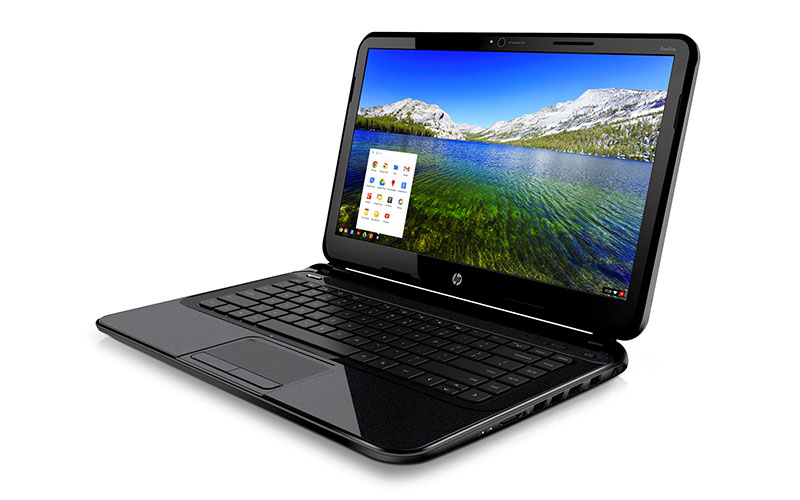
HP releases the chunkiest Chromebook
Is it my imagination, or does each new Chromebook get bulkier than the last? Today HP joined the Google operating system family, introducing the heaviest model (1.8 kg/3.96 pounds) with largest display (14 inches). Lenovo's ThinkPad Chromebook, announced in mid-January, is a tad lighter but the Acer C7, with smaller screen, is thicker. Perhaps the problem is this: PC manufacturers adapt low-cal Windows notebooks to Chrome OS; new Acer, HP and Lenovo models are more licensing plays than any attempt to innovate.
For PC manufacturers looking to offer something other than Windows, pay nothing for an operating system or capitalize on Google's bulging brand name, Chrome OS is enticing option. The lack of real investment, which demonstrates no sincere commitment, is wrong way to win or satisfy customers. Samsung proves the better Chromebook partner, by at least making some effort around system design, including adapting ARM processors.
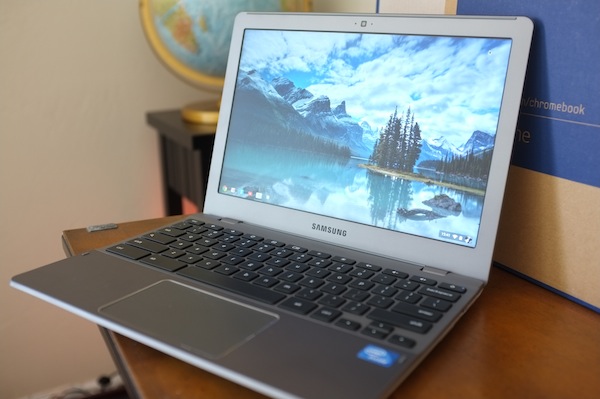
Google invites you to hack Chrome OS
Google is moving forward with Chrome, both the web browser and the operating system, quickly and seems to be gaining traction. Sure, the browser is popular, but the OS struggled early on, but new notebooks, err...Chromebooks, have been getting a lot of attention, including TV ads in the United States.
However, the search giant has learned that security is pretty important to the end-user, and probably more so to those looking at these computers, because buyers probably tend to be more on the "techie" side. That is why Google has annually invited people to "hack" Chrome in an effort to find and fix flaws.

Can we blame Best Buy's big MacBook Air sale on Chromebook?
If you ever wanted Apple's tiny laptop, cash in your savings or dig out the credit card. Best Buy has a short sale going, discounting MacBook Air by $200. That means price starting at $799.99 today and tomorrow for an 11.6-inch model with Intel Core i5 processor and 64GB SSD. Double the storage for another 100 bucks.
The promotion, part of Winter Doorbuster Days, is Friday and Saturday. Best Buy discounts other goodies, but MacBook Air stands out for the price, which lowers the entry cost to joining the Mac Fan Club. But Best Buy also sells the Samsung ARM Chromebook, for $249.99, also with 11.6-inch panel, similar size and weight and comparable (if not better) ergonomics. And Best Buy can't stock Chromebooks fast enough. While the company doesn't release sales data, social network chatter reveals bounty hard to get. So can we just blame Chromebook for Best Buy's sale?

Google shares rise on 2012 results
Investors rewarded Google today, pushing shares up close to 6.5 percent soon after the opening bell and staying in that range. At 12:09 PM EST, the stock traded at $748.23, up 6.45 percent. Google opened at $735.83, up from yesterday's $702.87 close.
After the closing bell, on January 22, Google delivered fourth quarter and 2012 results that clearly satisfy someone. For the year, Google revenue reached $50.18 billion, up 32 percent from $37.9 billion in 2011. Motorola contributed $4.14 billion. Net income: $10.74 billion or $32.81 earnings per share. Average analyst consensus was $41.41 billion revenue and $39.73 earnings per share. Oh, the wiles of investors. Yearly EPS missed the Street, as it did for the quarter.
